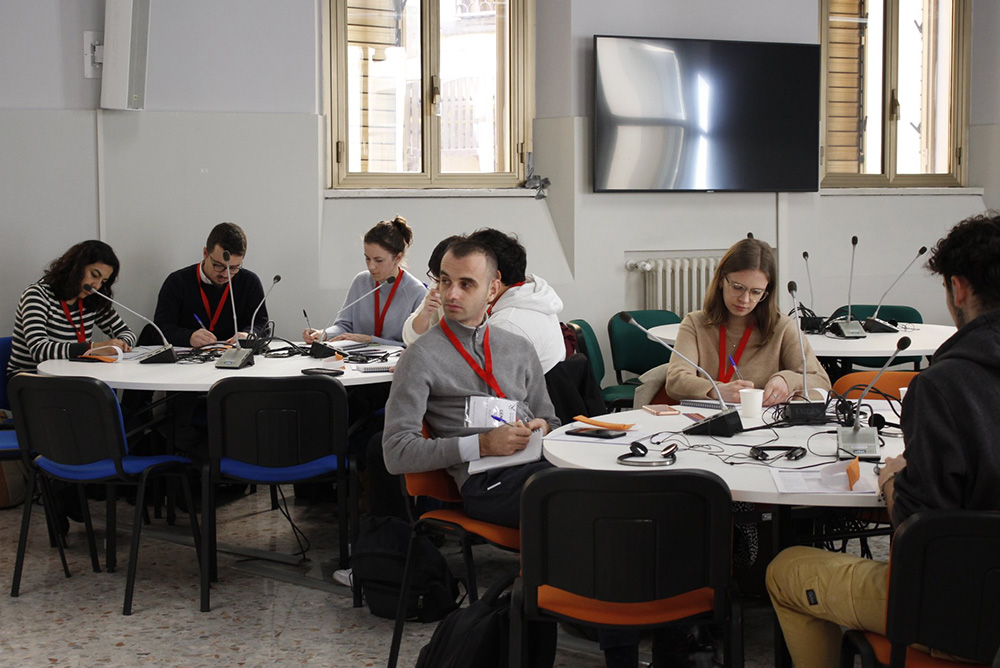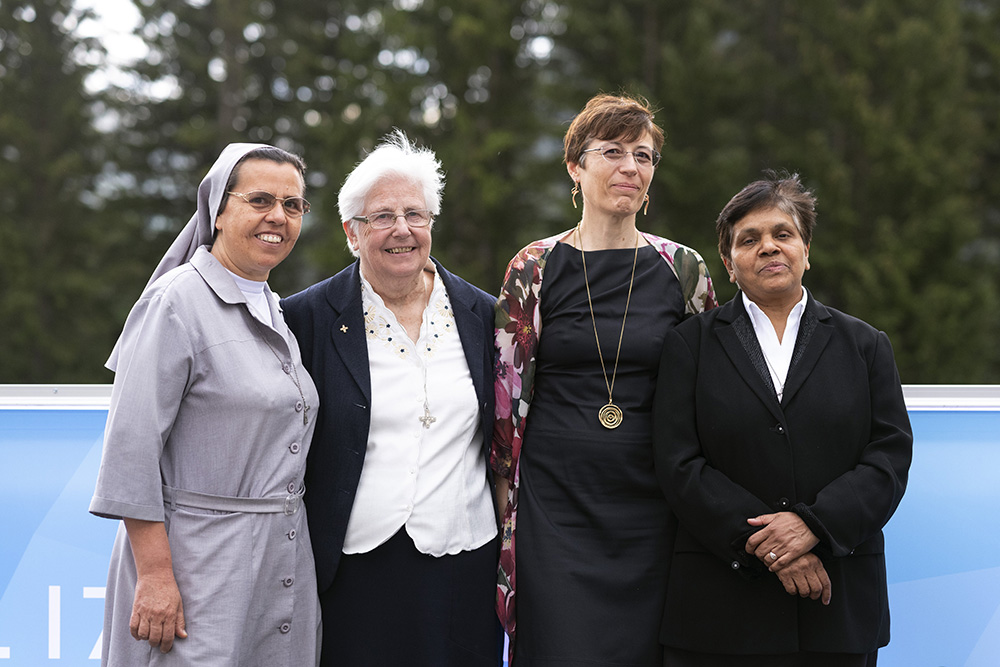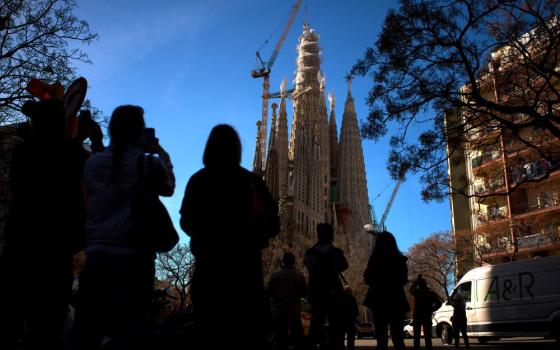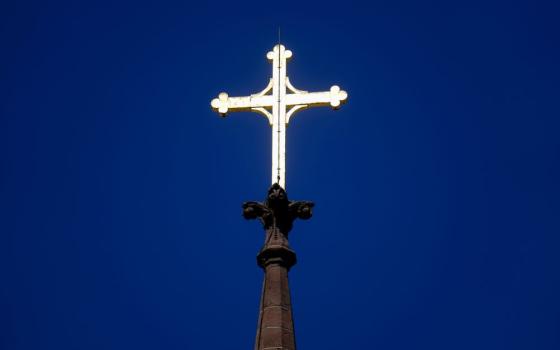
Representatives from anti-trafficking organizations participate in a workshop on educating young people on human trafficking at the headquarters of the International Union of Superiors General in Rome Feb. 6. (CNS/Courtesy of Talitha Kum and UISG)

The International Union of Superiors General (UISG), the Arise Foundation and the Conrad N. Hilton Foundation have announced that nominations are open for the inaugural Sisters Anti-Trafficking Awards.
Nominations for the award are open until June 12, a recent announcement of the award said. Sponsors anticipate the award will become an annual celebration of the work of three Catholic sisters, as representatives of their congregations and networks, "who have demonstrated exceptional courage, creativity, collaboration and achievement in the protection of their communities from human trafficking," the announcement said.
The announcement noted that the Sisters Anti-Trafficking Awards are an opportunity to highlight the work of Catholic sisters on the front lines against trafficking, to share knowledge and foster anti-trafficking efforts between congregations, and to broaden and deepen the protection of communities vulnerable to trafficking worldwide.
The winners will be announced at the Oct. 31 ceremony in London.
The three planned awards with the announcement's descriptions are:
- The Common Good Award — "Despite adverse conditions and sometimes scarce resources, sisters' resourcefulness and dedication are leading to effective and sustainable work against trafficking across the world. This award winner will have demonstrated creativity and courage in their anti-trafficking interventions."
- The Servant Leadership Award — "Embedded in their communities, sisters are often uniquely placed to lead through service and develop long-term anti-trafficking systems and networks. This award winner will have contributed to the growth of such networks, and have facilitated collaboration across cultures and religions."
- The Human Dignity Award — "The effectiveness of sisters' anti-trafficking work is often due to their familiarity with local customs and vulnerabilities, and the trust they have from local communities. This award winner will have a proven record of effective anti-slavery work over a period of fifteen or more years."
Anyone can submit a nomination, but only sisters can be nominated, according to the announcement, which provided a link for nomination guidelines.
Benedictine program receives accreditation
An online training program for women in faith-based ministries who are seeking to become professional leadership and life coaches has received an important accreditation.
The Benedictine Leadership and Life Coach Training for Women in Faith-Based Ministries recently received accreditation from the International Coaching Federation, an organization dedicated to the work of life coaching.
Advertisement
The training program, which was launched in October 2020 by the Benedictine Sisters of Pittsburgh, "benefits individuals in a wide range of positions including vowed members of a religious community, ordained ministers in any denomination, lay ministers, catechists, teachers, individuals working in faith-supported nonprofits, and other faith-based positions," the congregation said in a May 24 announcement.
The Benedictine coaching program was developed and led by Srs. Roberta Campbell, Evelyn Dettling and Susan English. The program's mission is to provide a professional coach training program for religious women that "promotes profound personal, spiritual and professional growth," the announcement said. The program is now accepting applicants for its fourth cohort, which begins in February 2024.
In announcing the accreditation, the congregation said that any "organization accredited by the ICF must complete a rigorous review process and demonstrate that its curriculum aligns with the ICF definition of coaching, core competencies and code of ethics. Graduation from a certified coaching education program qualifies participants as professional coaches."
The announcement added: "With rich backgrounds as leaders, educators and coaches themselves, Sisters Susan, Evelyn and Roberta see great value in teaching other women to become confident leaders as qualified coaches."
Said English, a master-certified coach and holder of a doctorate in education, "Participating in the Benedictine Leadership and Life Coach Training Program will enable graduates to discover new approaches for an existing ministry or even create a new ministry of professional coaching as a potential income-generating service.
"In addition, participants increase their ability to engage in complex thinking and strengthen communication skills needed for leadership and ministry."
UISG launches recommendations for environmental sustainability
In a May 24 press release, the International Union of Superiors General announced a policy brief that outlines nine recommendations to "address the challenges of climate change, biodiversity loss and pollution, with a particular focus on vulnerable people."
UISG met in April for the first of a series of dialogues on the environment with support from the UISG initiative Sisters Advocating Globally and the Global Solidarity Fund, according to the press release.

Leaders of the International Union of Superiors General and the Global Solidarity Fund are pictured at the World Economic Forum in Davos, Switzerland, May 23, 2022. From left are Salesian Sr. Ruth del Pilar Mora, a native of Colombia who was worked in Ethiopia for years; Loreto Sr. Patricia Murray, executive secretary of the women's International Union of Superiors General; Marta Guglielmetti, executive director of the Global Solidarity Fund; and Sr. Mary John Kudiyiruppil, a member of the Missionaries of the Holy Spirit from India and associate executive secretary of the International Union of Superiors General. (CNS/Courtesy of Gian Marco Maraviglia, Global Solidarity Fund)
UISG's nine recommendations are, according to the policy brief:
- Economic action: Advocate for a new, values-driven impetus for collective action, in order to build the financial infrastructure that can enable an economy of sustainable development.
- Educational action: Support institutions and initiatives that transmit knowledge, raise public awareness, and involve local actors in a sustainable manner.
- Legislative and legal action: Encourage governments and international organizations to mandate issues related to environmental sustainability, and legislate concrete measures to guarantee inclusivity.
- Environmental and social action: Emphasize the interconnectedness of environmental and social action as the only path to achieving social justice.
- Religious engagement: Harness the rootedness and reach of religious engagement to ensure the success of environmental initiatives.
- Partnerships, institutionalization and accreditation: Institutionalize women-led and faith-led capacity-building, and expand secular-religious partnerships with accredited national and international bodies.
- Integrative dialogue: Foster dialogue as an inclusive mechanism that can amplify marginalized voices, and ensure a leading role in global decision-making for local communities facing environmental challenges.
- Media and the arts: Channel the role of media and the arts in educating the public, changing the narrative on environmental breakdown, and focusing global attention on local issues.
- Scientific research: utilize the potential of research and education to help both leaders and local communities to make informed decisions and plans for action.
"In order to tackle the root causes of problems that are generated by human activity and by our systems of profit, we need to imagine a transition across all areas of our lives," Missionary Sister of Our Lady of Africa Sr. Maamalifar Poreku, coordinator of UISG's environmental campaign Sowing Hope for the Planet, said in the press release. "As Catholic sisters, this is how we approach the implementation of outcomes from COP27 and COP15: as a holistic challenge to strengthen our care for creation. We must encourage global leaders to think outside the box when it comes to financial commitments and lifestyle changes, and seek radical solutions to radical challenges."





